Bell-ringers in Stohos, Thessaloniki, Picture: www.clickatlife.gr
Customs of the island of Leros also have a playful character. In the old days, "scoundrels", painted with charcoal and wrapped in blankets, wandered the streets and teased villagers. Today, that role is played by "poets." With imagination and a sarcastic mood, they create funny rhymes and young children dressed as monks go from house to house and recite them. A grand celebration follows, with traditional music, ouzo, wine and traditional snacks. The same custom is celebrated on the islands of Kos and Symi.
Amorgos
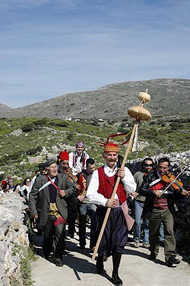
In Egiali, and more specifically in the village of Langada, the custom of "The Captain" comes alive. Young people dressed in traditional costumes, to the sounds of local musical instruments, go to the local church. There, the village priest throws something like a robe in the air and whoever catches it is called "The Captain". Then, the parade of youths begins, which ends in the square. The new captain chooses a girl who becomes the "Lady Captain". The feast lasts until the morning of Clean Monday with singing, dancing, brandy and fried fish. The custom of the island of Serifos is similar.
Skyros
If you want to hear the events of the year, presented satirically, then Skyros, during the first Sunday before Lent, is the perfect place. Its inhabitants, mostly fishermen, indulge in rhymed satire, that overviews the major events of the past year. Groups of mummers wander the forests, and you may encounter "Elders" with bells and "Franks." If two groups of mummers meet, they compete with one another, ringing their bells and making a great noise.
Corfu
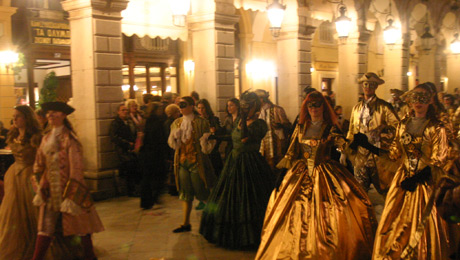
Corfu's rituals are of Venetian and ancient Greek origin. The carnival of the island has already become famous, but there are also lesser-known local customs. For example, on the first Sunday before Lent. Just before all the events have finished, the town crier comes out and announces the arrival of the Lord of the Carnival. After reading aloud his will, everything is ready for the end of carnival. Some villages of Corfu still celebrate the customs "The wedding" and "The dance of priests."
Crete
Rethymno
The inhabitants of Gergeri village, dressed in sheepskins with belts with bells and filthy faces and hands, go out in the streets and indulge in a "bear" dance. Tied together, they follow each other, run, dance and tell jokes, creating an atmosphere of exultation.
Yet another tradition has survived in the area of Rethymno - "The stealing of the bride". The groom and bride are disguised men holding a doll-baby with a painted moustache, in order to resemble his "father". Other role plays include "The field and seed" and "The camel", which is formed by an animal's skull and two men running hidden under large canvas, recreating a four-legged animal.
Central Greece, Thessaly
Amfissa
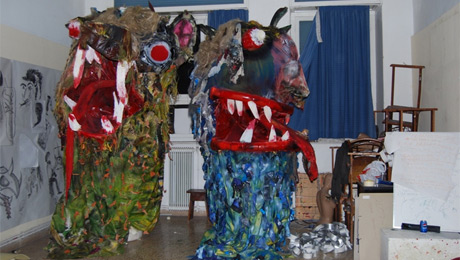
During the last weekend of Lent, the myth of the "spirit" comes alive in Amfissa. From the neighbourhood of Harman, where the old leather workshops are located, and up the staircase of St. Nicholas, the "spirit" rises followed by a group of people dressed in costumes. The big historical cafe of the city hosts endless conversations of satirical nature about myths and ghosts. Traditionally, in the area, "spirits" are the souls of dead people or animals that haunt the surrounding area.
Galaxidi
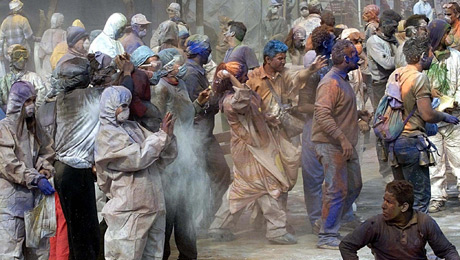
"The Flour War" has been an institution for three centuries. Large quantities of flour are shot against the participants in the carnival, whose faces must be painted with charcoal. In recent years, people paint their faces with other substances, such as shoe polish. The custom dates back to the period of the Ottoman rule.
Thebes
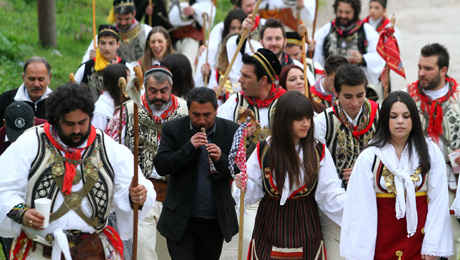
In the area of Thebes, a "Wallachian wedding" is recreated on Clean Monday. The multicolour wedding procession and traditional instruments that accompany it are a harbinger of the great festival, which will take place on the evening of the last Sunday before Lent in the central square. The roots of this custom date back to 1830, when the shepherds - Wallachians of Macedonia, Epirus, Thessaly and Roumelia - abandoned their pastures in order to seek grasslands to the south.
Larissa-Tyrnavos
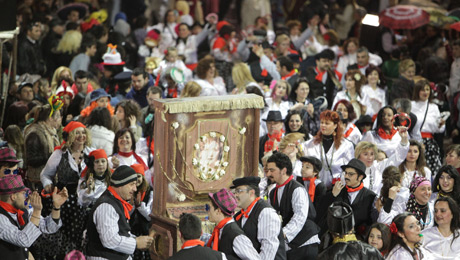
On the last Tuesday before Clean Monday, residents of Tyrnavos start a series of events in honour of the god Dionysus, and the peak event is the "Bourani" (this is a kind of soup). During the preparation, scenes with phallic symbols and bold banter are acted out.
The Peloponnese
Kalamata
The central square of Kalamata holds the custom "Wallachian wedding". Participants are dressed up in costumes and meet in the square, where they start a party with dancing, songs and treats.
Methoni